
ChatTTS
A generative speech model for daily dialogue.
Stars: 33897
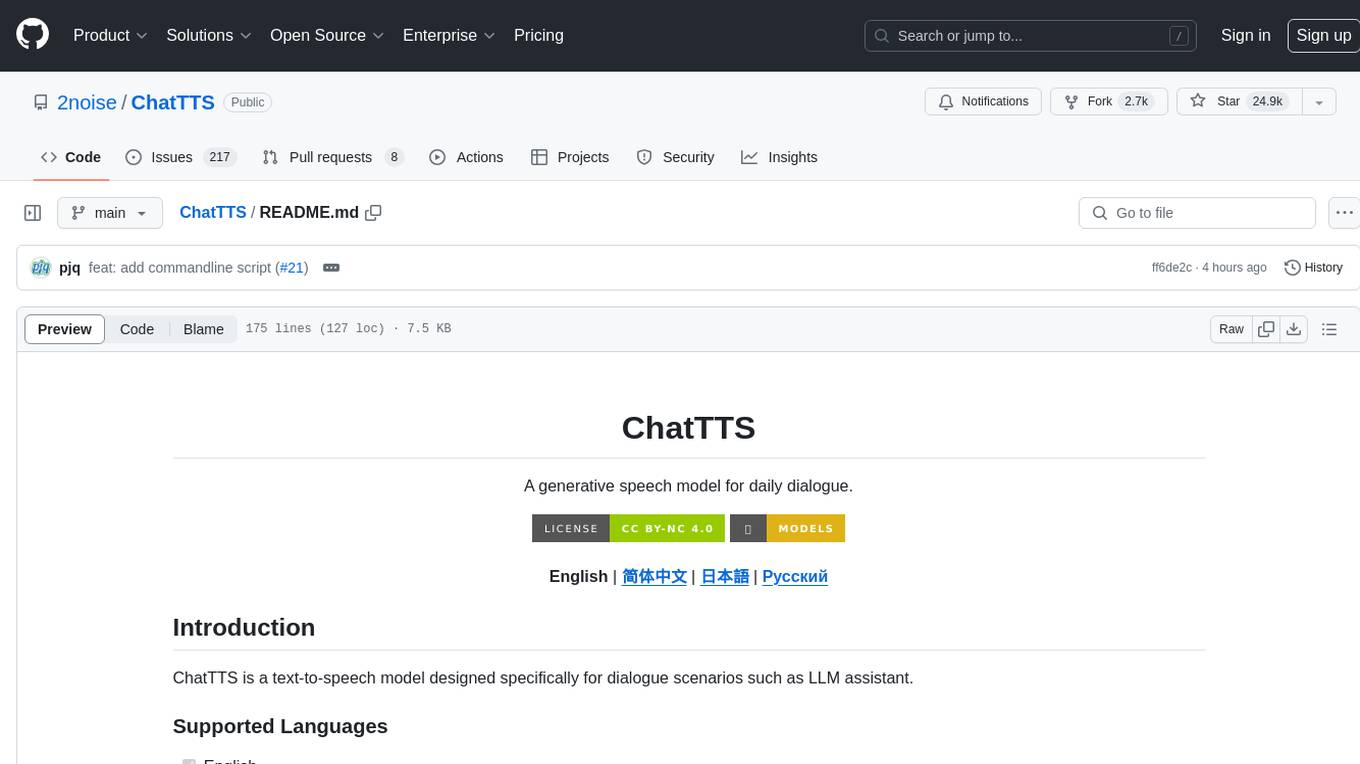
ChatTTS is a generative speech model optimized for dialogue scenarios, providing natural and expressive speech synthesis with fine-grained control over prosodic features. It supports multiple speakers and surpasses most open-source TTS models in terms of prosody. The model is trained with 100,000+ hours of Chinese and English audio data, and the open-source version on HuggingFace is a 40,000-hour pre-trained model without SFT. The roadmap includes open-sourcing additional features like VQ encoder, multi-emotion control, and streaming audio generation. The tool is intended for academic and research use only, with precautions taken to limit potential misuse.
README:
A generative speech model for daily dialogue.
[!Note] This repo contains the algorithm infrastructure and some simple examples.
[!Tip] For the extended end-user products, please refer to the index repo Awesome-ChatTTS maintained by the community.
ChatTTS is a text-to-speech model designed specifically for dialogue scenarios such as LLM assistant.
- [x] English
- [x] Chinese
- [ ] Coming Soon...
You can refer to this video on Bilibili for the detailed description.
- Conversational TTS: ChatTTS is optimized for dialogue-based tasks, enabling natural and expressive speech synthesis. It supports multiple speakers, facilitating interactive conversations.
- Fine-grained Control: The model could predict and control fine-grained prosodic features, including laughter, pauses, and interjections.
- Better Prosody: ChatTTS surpasses most of open-source TTS models in terms of prosody. We provide pretrained models to support further research and development.
[!Important] The released model is for academic purposes only.
- The main model is trained with Chinese and English audio data of 100,000+ hours.
- The open-source version on HuggingFace is a 40,000 hours pre-trained model without SFT.
- [x] Open-source the 40k-hours-base model and spk_stats file.
- [x] Streaming audio generation.
- [x] Open-source DVAE encoder and zero shot inferring code.
- [ ] Multi-emotion controlling.
- [ ] ChatTTS.cpp (new repo in
2noiseorg is welcomed)
The code is published under AGPLv3+ license.
The model is published under CC BY-NC 4.0 license. It is intended for educational and research use, and should not be used for any commercial or illegal purposes. The authors do not guarantee the accuracy, completeness, or reliability of the information. The information and data used in this repo, are for academic and research purposes only. The data obtained from publicly available sources, and the authors do not claim any ownership or copyright over the data.
ChatTTS is a powerful text-to-speech system. However, it is very important to utilize this technology responsibly and ethically. To limit the use of ChatTTS, we added a small amount of high-frequency noise during the training of the 40,000-hour model, and compressed the audio quality as much as possible using MP3 format, to prevent malicious actors from potentially using it for criminal purposes. At the same time, we have internally trained a detection model and plan to open-source it in the future.
GitHub issues/PRs are always welcomed.
For formal inquiries about the model and roadmap, please contact us at [email protected].
- Group 1, 808364215
- Group 2, 230696694
- Group 3, 933639842
- Group 4, 608667975
Join by clicking here.
git clone https://github.com/2noise/ChatTTS
cd ChatTTSpip install --upgrade -r requirements.txtconda create -n chattts python=3.11
conda activate chattts
pip install -r requirements.txtpip install safetensors vllm==0.2.7 torchaudio[!Warning] DO NOT INSTALL! The adaptation of TransformerEngine is currently under development and CANNOT run properly now. Only install it on developing purpose. See more details on at #672 #676
[!Note] The installation process is very slow.
pip install git+https://github.com/NVIDIA/TransformerEngine.git@stable[!Warning] DO NOT INSTALL! Currently the FlashAttention-2 will slow down the generating speed according to this issue. Only install it on developing purpose.
[!Note] See supported devices at the Hugging Face Doc.
pip install flash-attn --no-build-isolationMake sure you are under the project root directory when you execute these commands below.
python examples/web/webui.pyIt will save audio to
./output_audio_n.mp3
python examples/cmd/run.py "Your text 1." "Your text 2."- Install the stable version from PyPI
pip install ChatTTS- Install the latest version from GitHub
pip install git+https://github.com/2noise/ChatTTS- Install from local directory in dev mode
pip install -e .import ChatTTS
import torch
import torchaudio
chat = ChatTTS.Chat()
chat.load(compile=False) # Set to True for better performance
texts = ["PUT YOUR 1st TEXT HERE", "PUT YOUR 2nd TEXT HERE"]
wavs = chat.infer(texts)
for i in range(len(wavs)):
"""
In some versions of torchaudio, the first line works but in other versions, so does the second line.
"""
try:
torchaudio.save(f"basic_output{i}.wav", torch.from_numpy(wavs[i]).unsqueeze(0), 24000)
except:
torchaudio.save(f"basic_output{i}.wav", torch.from_numpy(wavs[i]), 24000)###################################
# Sample a speaker from Gaussian.
rand_spk = chat.sample_random_speaker()
print(rand_spk) # save it for later timbre recovery
params_infer_code = ChatTTS.Chat.InferCodeParams(
spk_emb = rand_spk, # add sampled speaker
temperature = .3, # using custom temperature
top_P = 0.7, # top P decode
top_K = 20, # top K decode
)
###################################
# For sentence level manual control.
# use oral_(0-9), laugh_(0-2), break_(0-7)
# to generate special token in text to synthesize.
params_refine_text = ChatTTS.Chat.RefineTextParams(
prompt='[oral_2][laugh_0][break_6]',
)
wavs = chat.infer(
texts,
params_refine_text=params_refine_text,
params_infer_code=params_infer_code,
)
###################################
# For word level manual control.
text = 'What is [uv_break]your favorite english food?[laugh][lbreak]'
wavs = chat.infer(text, skip_refine_text=True, params_refine_text=params_refine_text, params_infer_code=params_infer_code)
"""
In some versions of torchaudio, the first line works but in other versions, so does the second line.
"""
try:
torchaudio.save("word_level_output.wav", torch.from_numpy(wavs[0]).unsqueeze(0), 24000)
except:
torchaudio.save("word_level_output.wav", torch.from_numpy(wavs[0]), 24000)inputs_en = """
chat T T S is a text to speech model designed for dialogue applications.
[uv_break]it supports mixed language input [uv_break]and offers multi speaker
capabilities with precise control over prosodic elements like
[uv_break]laughter[uv_break][laugh], [uv_break]pauses, [uv_break]and intonation.
[uv_break]it delivers natural and expressive speech,[uv_break]so please
[uv_break] use the project responsibly at your own risk.[uv_break]
""".replace('\n', '') # English is still experimental.
params_refine_text = ChatTTS.Chat.RefineTextParams(
prompt='[oral_2][laugh_0][break_4]',
)
audio_array_en = chat.infer(inputs_en, params_refine_text=params_refine_text)
torchaudio.save("self_introduction_output.wav", torch.from_numpy(audio_array_en[0]), 24000)|
male speaker |
female speaker |
For a 30-second audio clip, at least 4GB of GPU memory is required. For the 4090 GPU, it can generate audio corresponding to approximately 7 semantic tokens per second. The Real-Time Factor (RTF) is around 0.3.
This is a problem that typically occurs with autoregressive models (for bark and valle). It's generally difficult to avoid. One can try multiple samples to find a suitable result.
In the current released model, the only token-level control units are [laugh], [uv_break], and [lbreak]. In future versions, we may open-source models with additional emotional control capabilities.
- bark, XTTSv2 and valle demonstrate a remarkable TTS result by an autoregressive-style system.
- fish-speech reveals capability of GVQ as audio tokenizer for LLM modeling.
- vocos which is used as a pretrained vocoder.
- wlu-audio lab for early algorithm experiments.
For Tasks:
Click tags to check more tools for each tasksFor Jobs:
Alternative AI tools for ChatTTS
Similar Open Source Tools

ChatTTS
ChatTTS is a generative speech model optimized for dialogue scenarios, providing natural and expressive speech synthesis with fine-grained control over prosodic features. It supports multiple speakers and surpasses most open-source TTS models in terms of prosody. The model is trained with 100,000+ hours of Chinese and English audio data, and the open-source version on HuggingFace is a 40,000-hour pre-trained model without SFT. The roadmap includes open-sourcing additional features like VQ encoder, multi-emotion control, and streaming audio generation. The tool is intended for academic and research use only, with precautions taken to limit potential misuse.
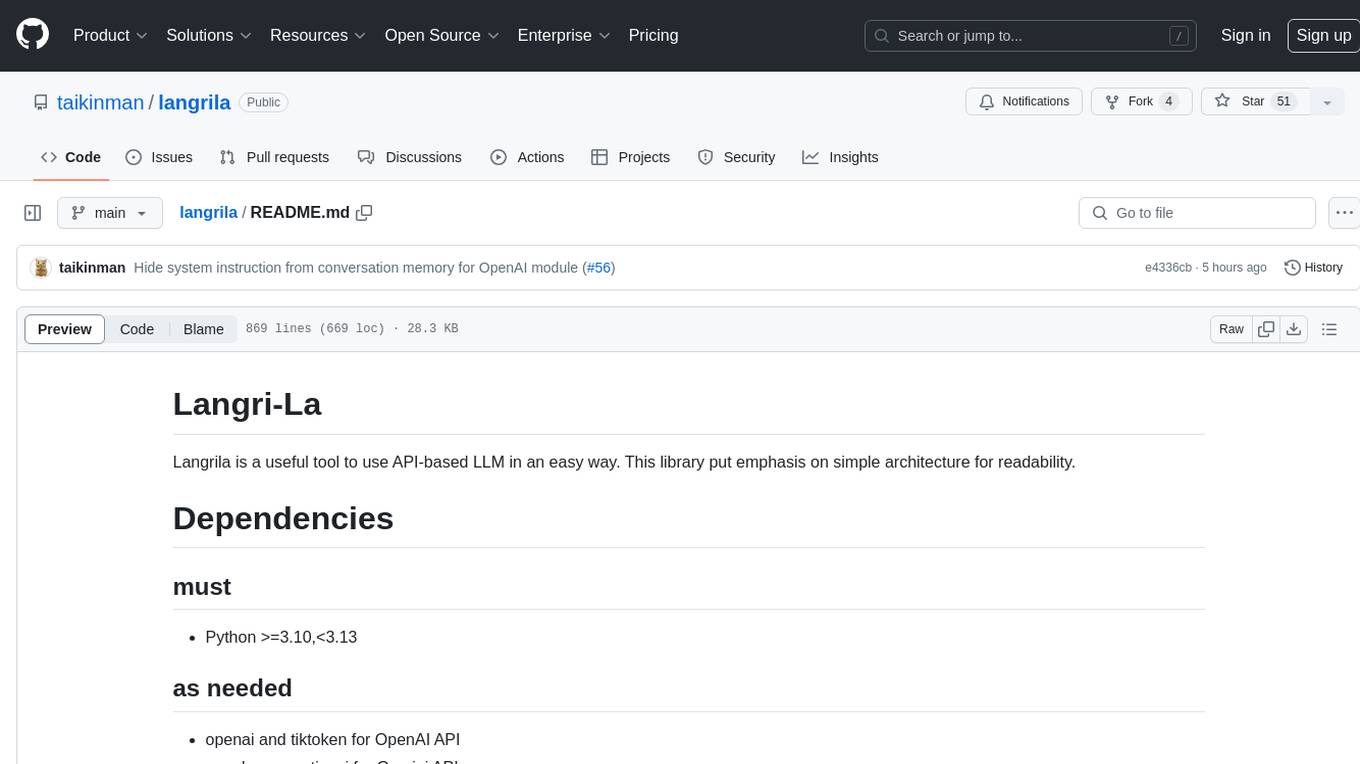
langrila
Langrila is a library that provides an easy way to use API-based LLM (Large Language Models) with an emphasis on simple architecture for readability. It supports various AI models for chat and embedding tasks, as well as retrieval functionalities using Qdrant, Chroma, and Usearch. Langrila also includes modules for function calling, conversation memory management, and prompt templates. It enforces coding policies for simplicity, responsibility independence, and minimum module implementation. The library requires Python version 3.10 to 3.13 and additional dependencies like OpenAI, Gemini, Qdrant, Chroma, and Usearch for specific functionalities.
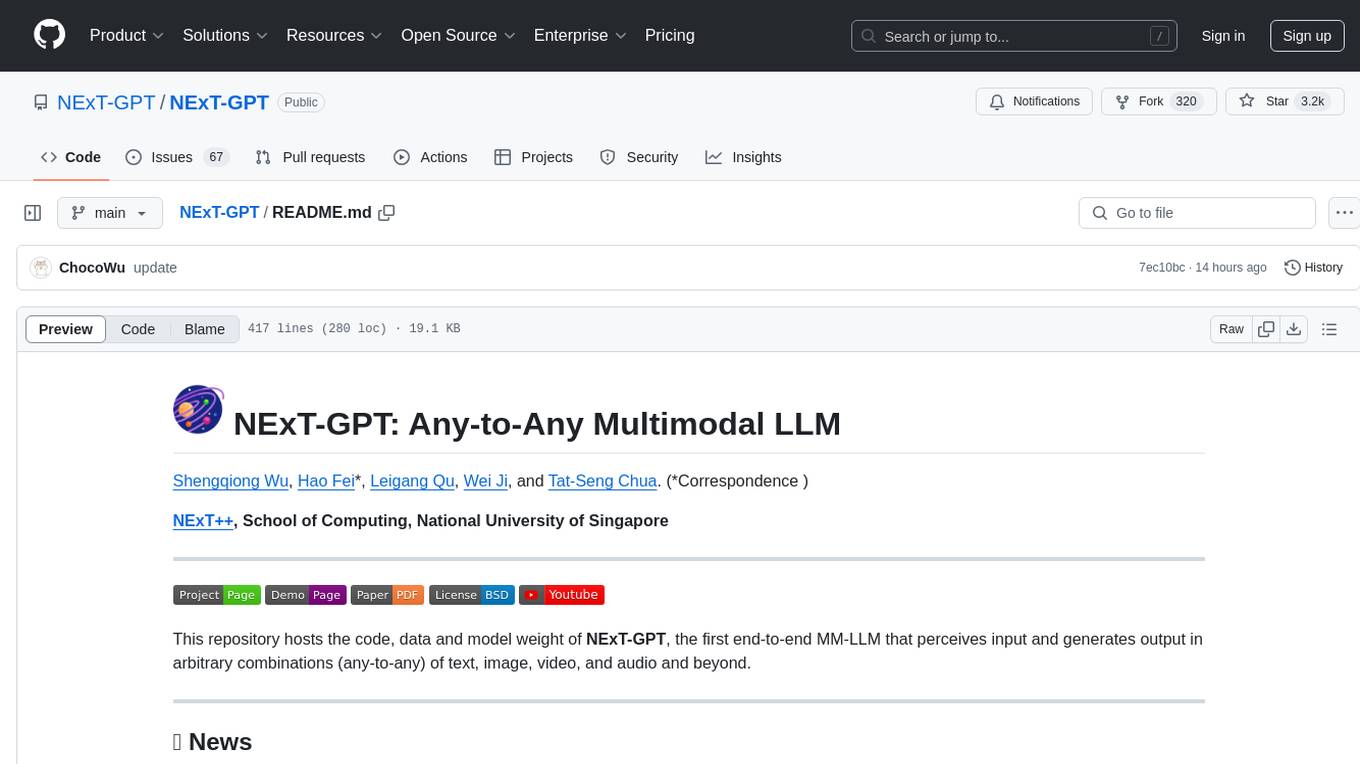
NExT-GPT
NExT-GPT is an end-to-end multimodal large language model that can process input and generate output in various combinations of text, image, video, and audio. It leverages existing pre-trained models and diffusion models with end-to-end instruction tuning. The repository contains code, data, and model weights for NExT-GPT, allowing users to work with different modalities and perform tasks like encoding, understanding, reasoning, and generating multimodal content.
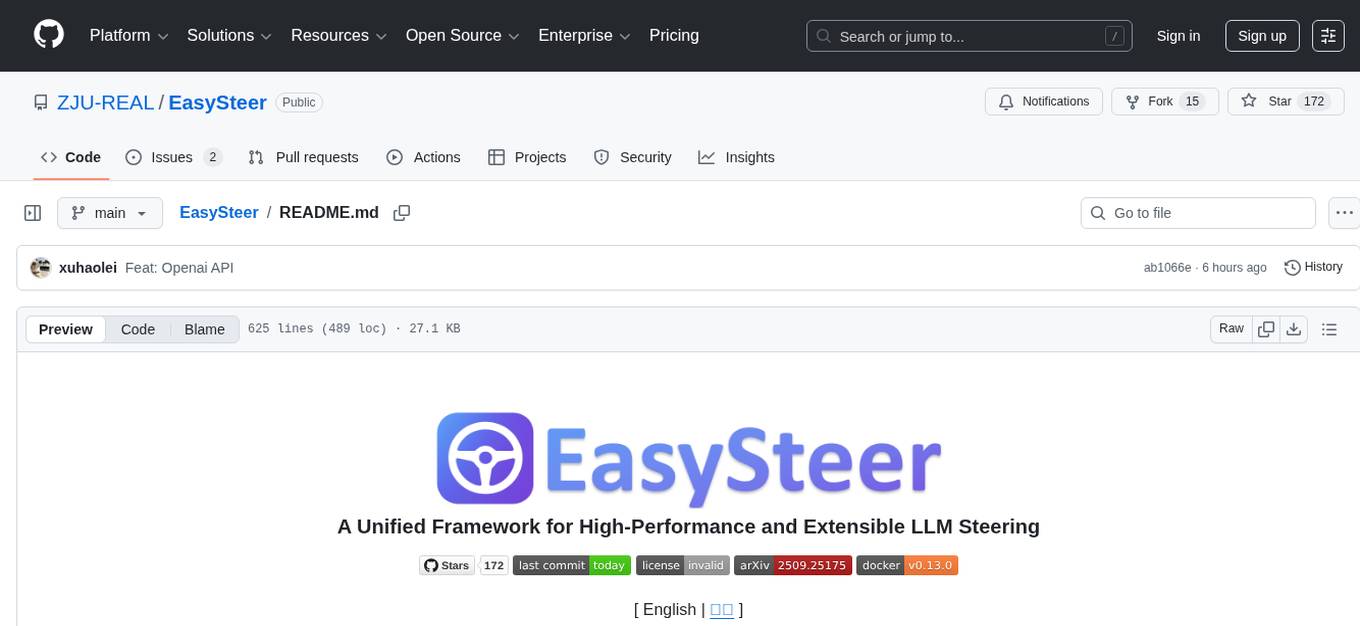
EasySteer
EasySteer is a unified framework built on vLLM for high-performance LLM steering. It offers fast, flexible, and easy-to-use steering capabilities with features like high performance, modular design, fine-grained control, pre-computed steering vectors, and an interactive demo. Users can interactively configure models, adjust steering parameters, and test interventions without writing code. The tool supports OpenAI-compatible APIs and provides modules for hidden states extraction, analysis-based steering, learning-based steering, and a frontend web interface for interactive steering and ReFT interventions.
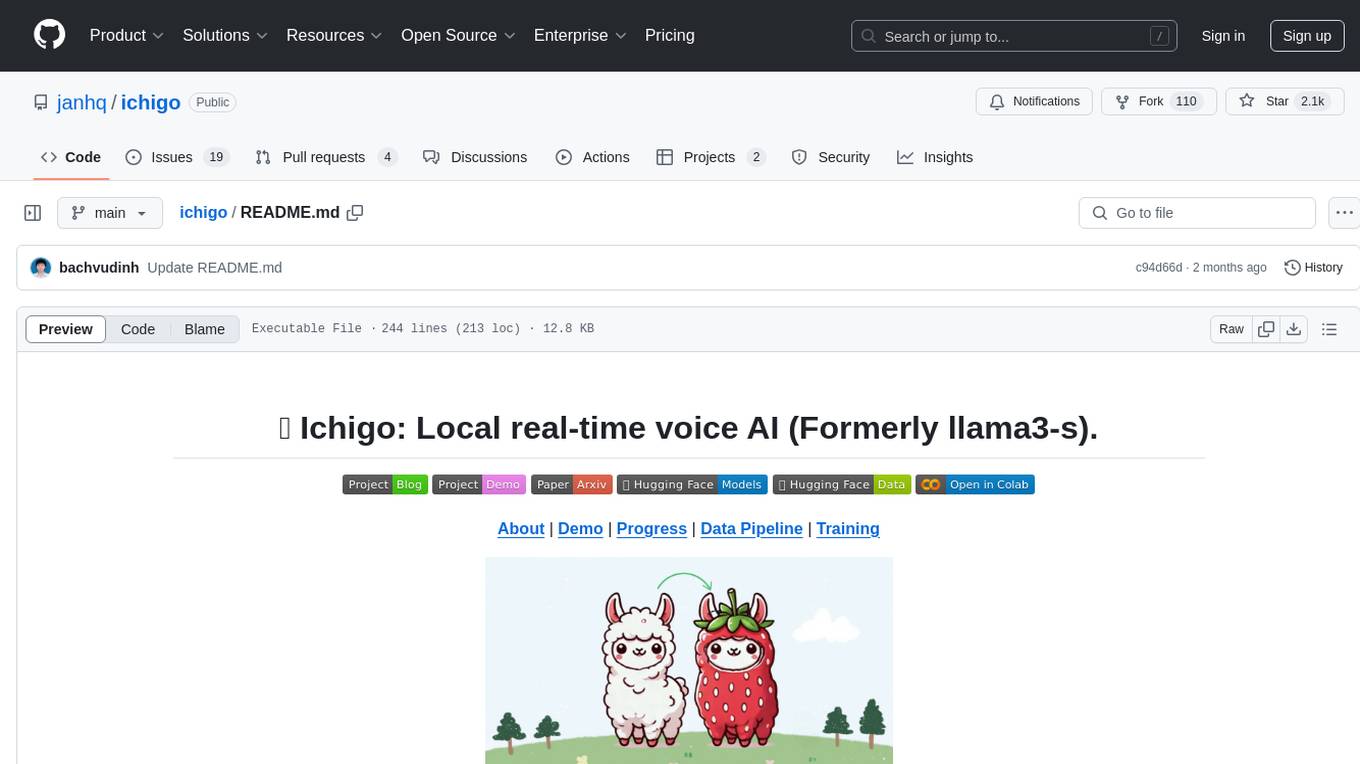
ichigo
Ichigo is a local real-time voice AI tool that uses an early fusion technique to extend a text-based LLM to have native 'listening' ability. It is an open research experiment with improved multiturn capabilities and the ability to refuse processing inaudible queries. The tool is designed for open data, open weight, on-device Siri-like functionality, inspired by Meta's Chameleon paper. Ichigo offers a web UI demo and Gradio web UI for users to interact with the tool. It has achieved enhanced MMLU scores, stronger context handling, advanced noise management, and improved multi-turn capabilities for a robust user experience.
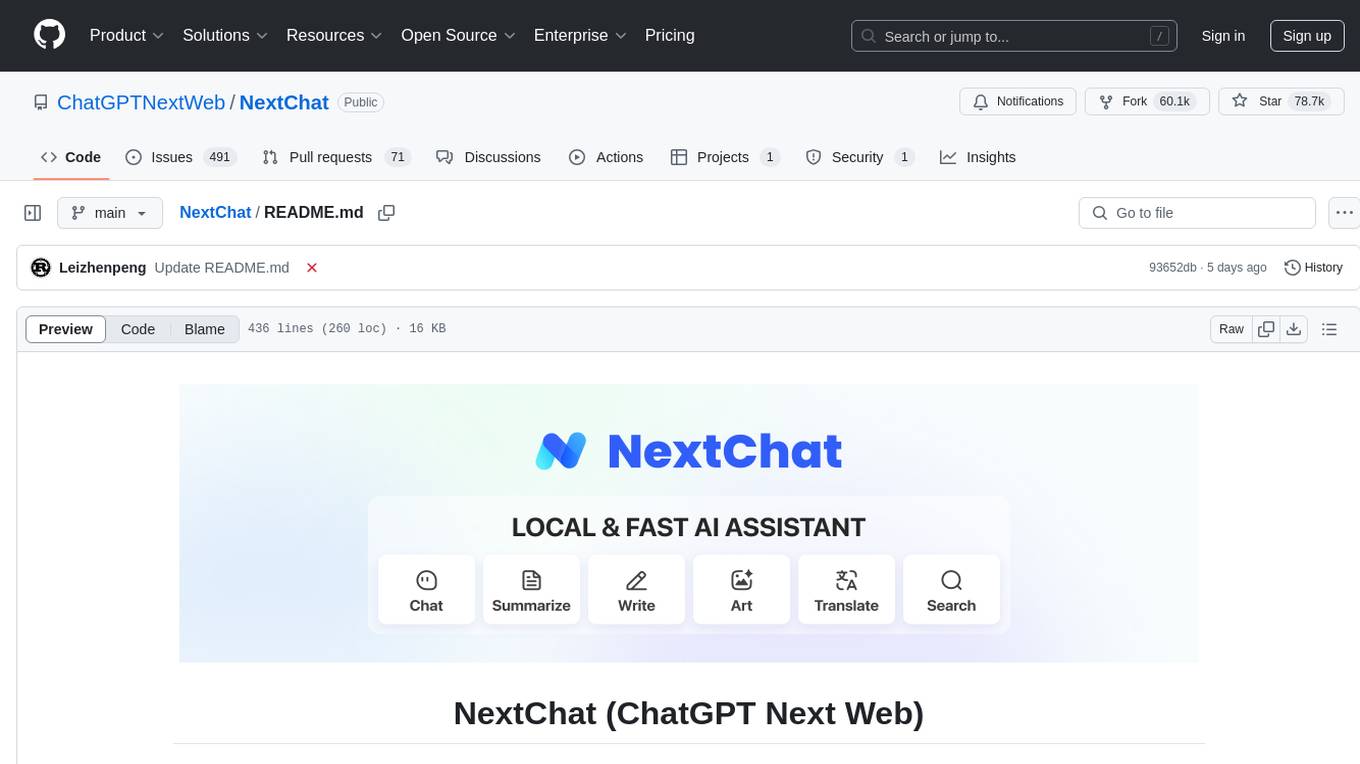
NextChat
NextChat is a well-designed cross-platform ChatGPT web UI tool that supports Claude, GPT4, and Gemini Pro. It offers a compact client for Linux, Windows, and MacOS, with features like self-deployed LLMs compatibility, privacy-first data storage, markdown support, responsive design, and fast loading speed. Users can create, share, and debug chat tools with prompt templates, access various prompts, compress chat history, and use multiple languages. The tool also supports enterprise-level privatization and customization deployment, with features like brand customization, resource integration, permission control, knowledge integration, security auditing, private deployment, and continuous updates.
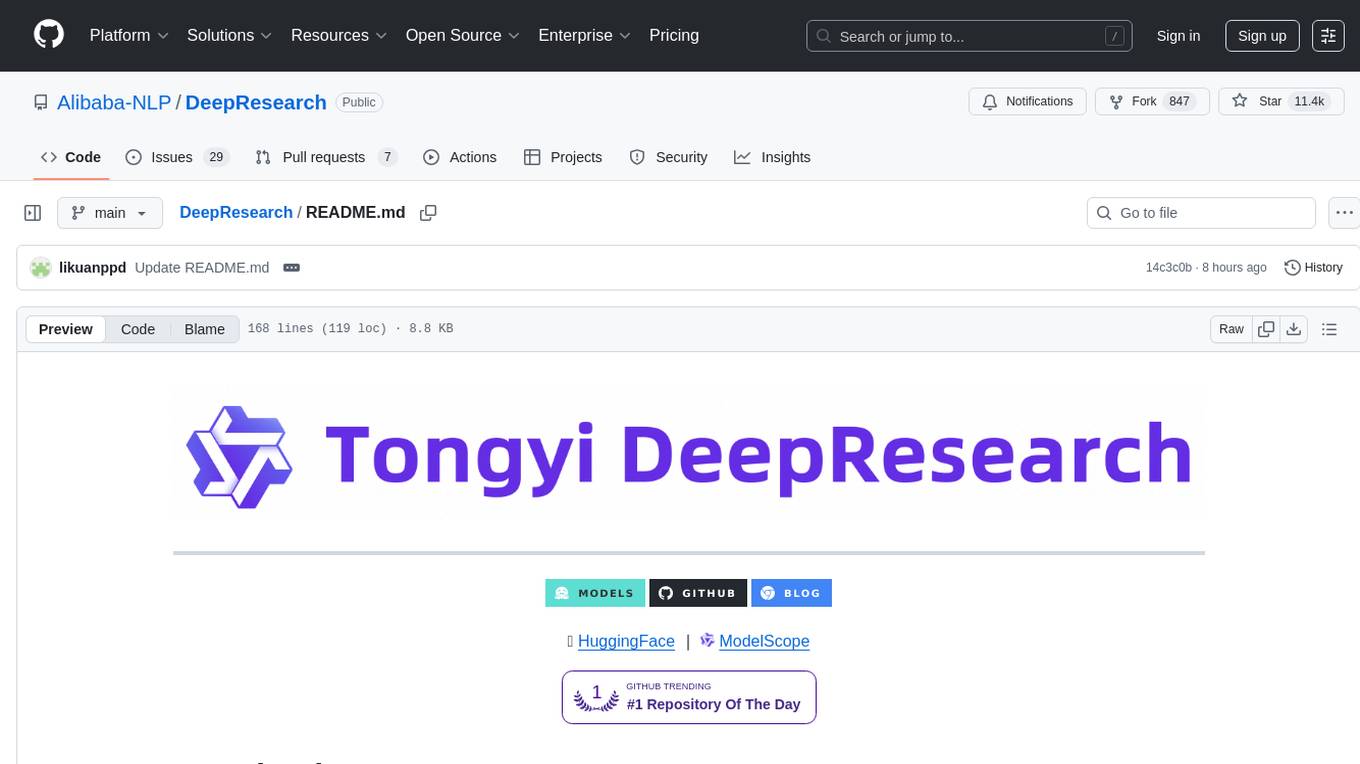
DeepResearch
Tongyi DeepResearch is an agentic large language model with 30.5 billion total parameters, designed for long-horizon, deep information-seeking tasks. It demonstrates state-of-the-art performance across various search benchmarks. The model features a fully automated synthetic data generation pipeline, large-scale continual pre-training on agentic data, end-to-end reinforcement learning, and compatibility with two inference paradigms. Users can download the model directly from HuggingFace or ModelScope. The repository also provides benchmark evaluation scripts and information on the Deep Research Agent Family.
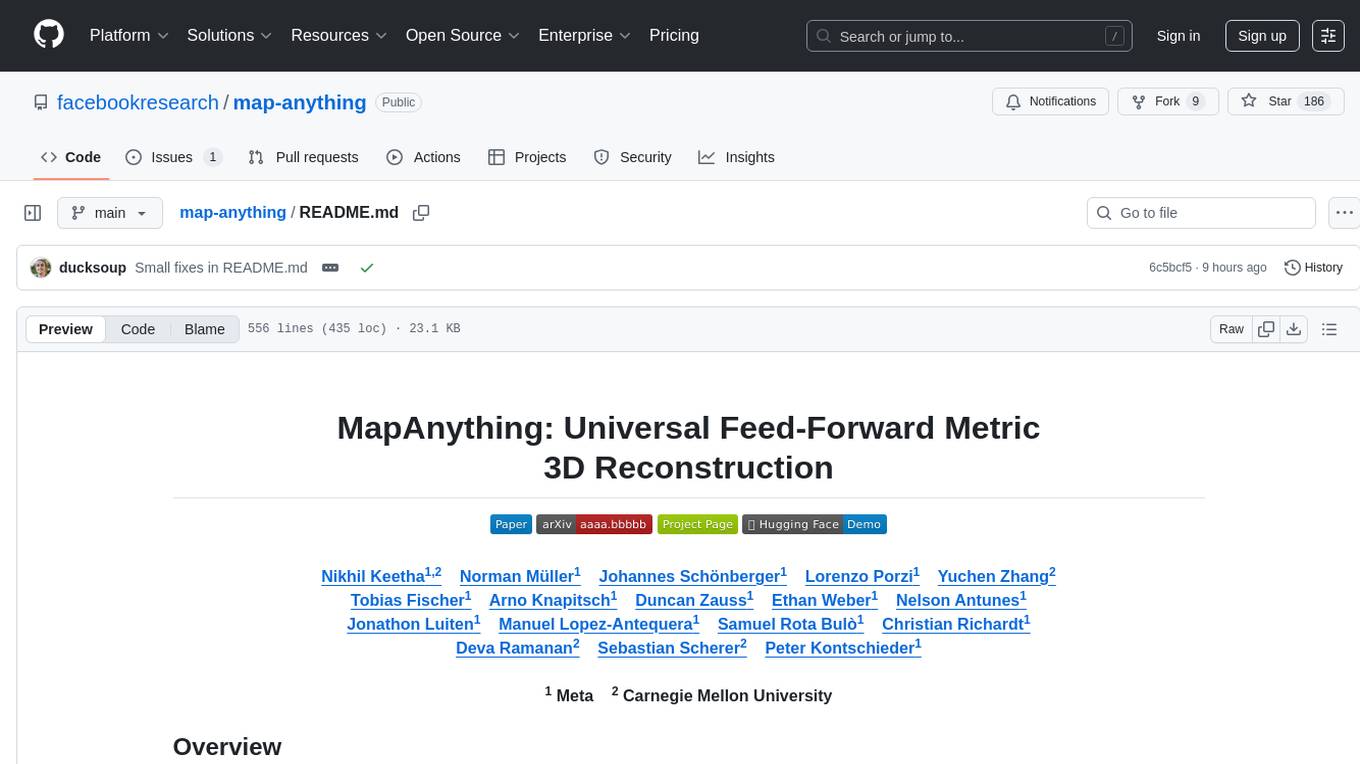
map-anything
MapAnything is an end-to-end trained transformer model for 3D reconstruction tasks, supporting over 12 different tasks including multi-image sfm, multi-view stereo, monocular metric depth estimation, and more. It provides a simple and efficient way to regress the factored metric 3D geometry of a scene from various inputs like images, calibration, poses, or depth. The tool offers flexibility in combining different geometric inputs for enhanced reconstruction results. It includes interactive demos, support for COLMAP & GSplat, data processing for training & benchmarking, and pre-trained models on Hugging Face Hub with different licensing options.
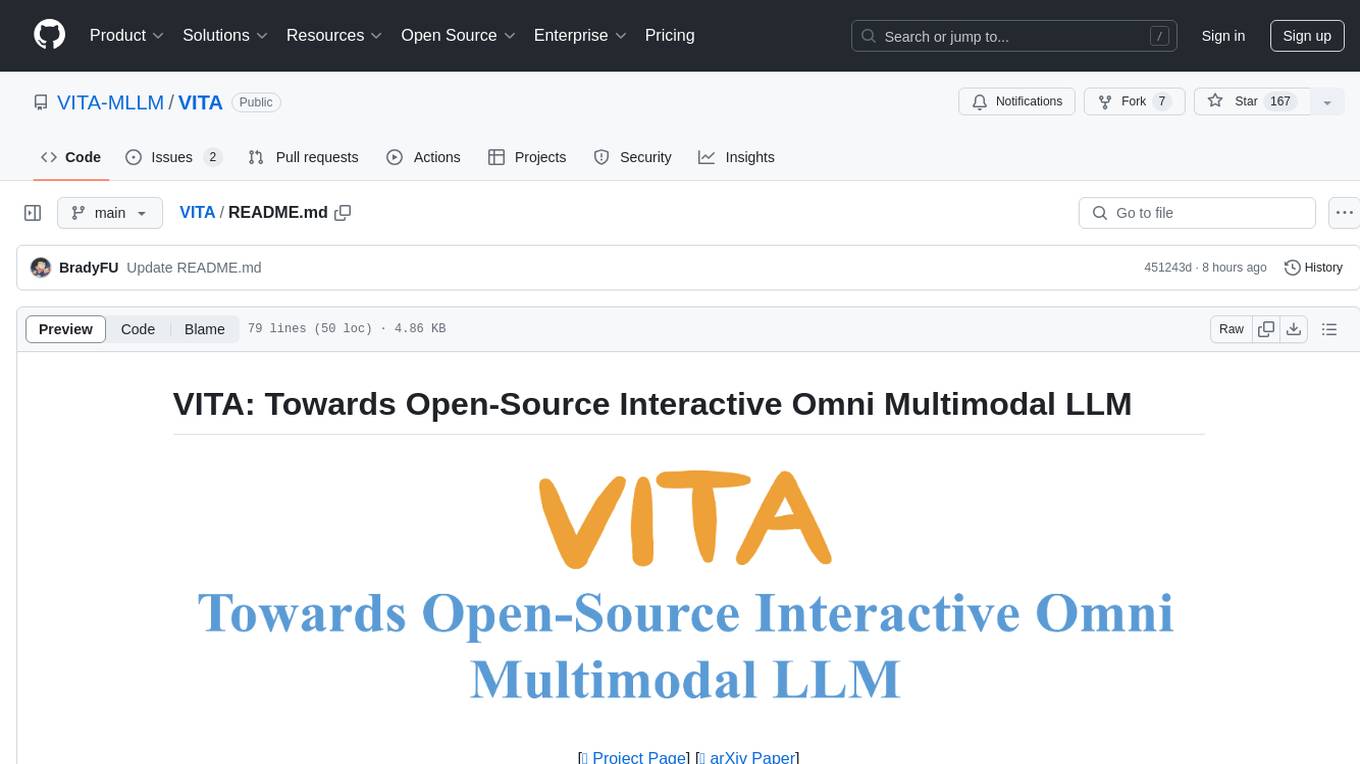
VITA
VITA is an open-source interactive omni multimodal Large Language Model (LLM) capable of processing video, image, text, and audio inputs simultaneously. It stands out with features like Omni Multimodal Understanding, Non-awakening Interaction, and Audio Interrupt Interaction. VITA can respond to user queries without a wake-up word, track and filter external queries in real-time, and handle various query inputs effectively. The model utilizes state tokens and a duplex scheme to enhance the multimodal interactive experience.
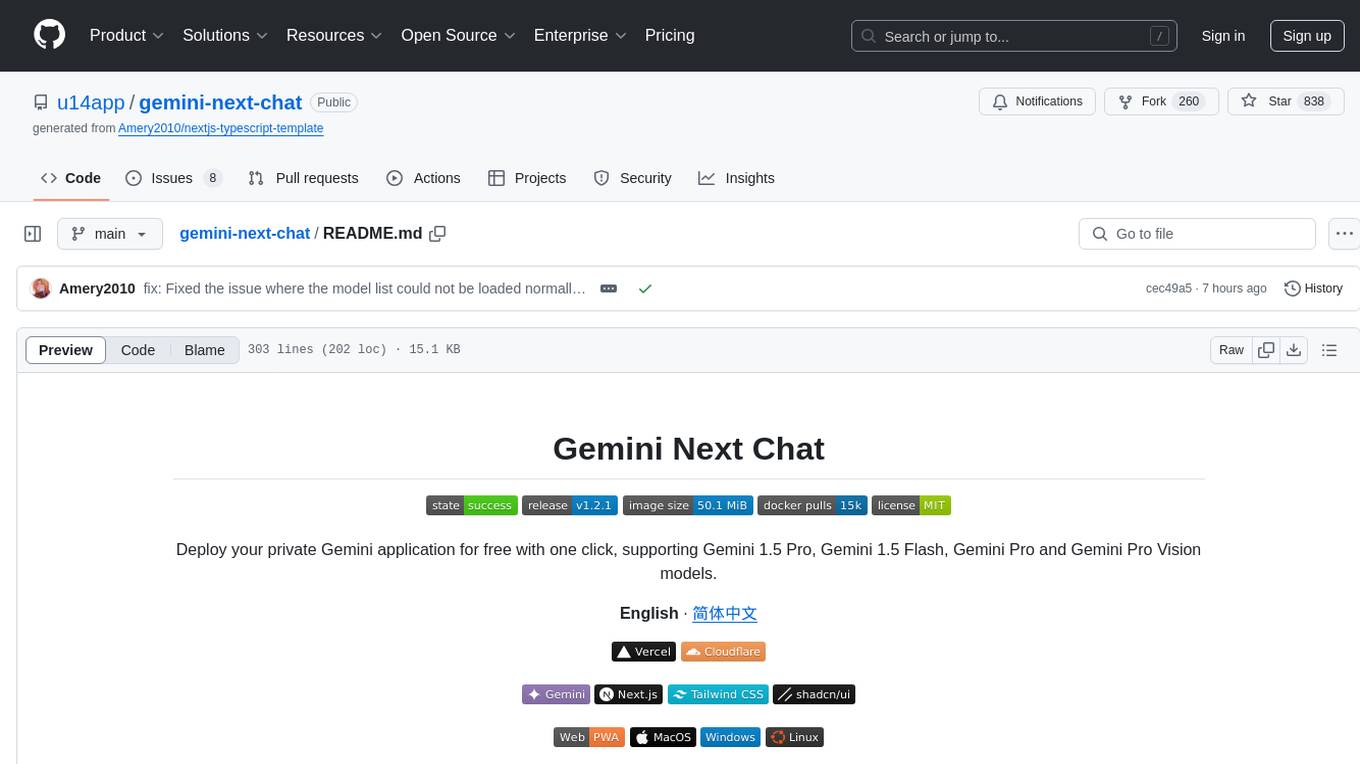
gemini-next-chat
Gemini Next Chat is an open-source, extensible high-performance Gemini chatbot framework that supports one-click free deployment of private Gemini web applications. It provides a simple interface with image recognition and voice conversation, supports multi-modal models, talk mode, visual recognition, assistant market, support plugins, conversation list, full Markdown support, privacy and security, PWA support, well-designed UI, fast loading speed, static deployment, and multi-language support.

nyxtext
Nyxtext is a text editor built using Python, featuring Custom Tkinter with the Catppuccin color scheme and glassmorphic design. It follows a modular approach with each element organized into separate files for clarity and maintainability. NyxText is not just a text editor but also an AI-powered desktop application for creatives, developers, and students.
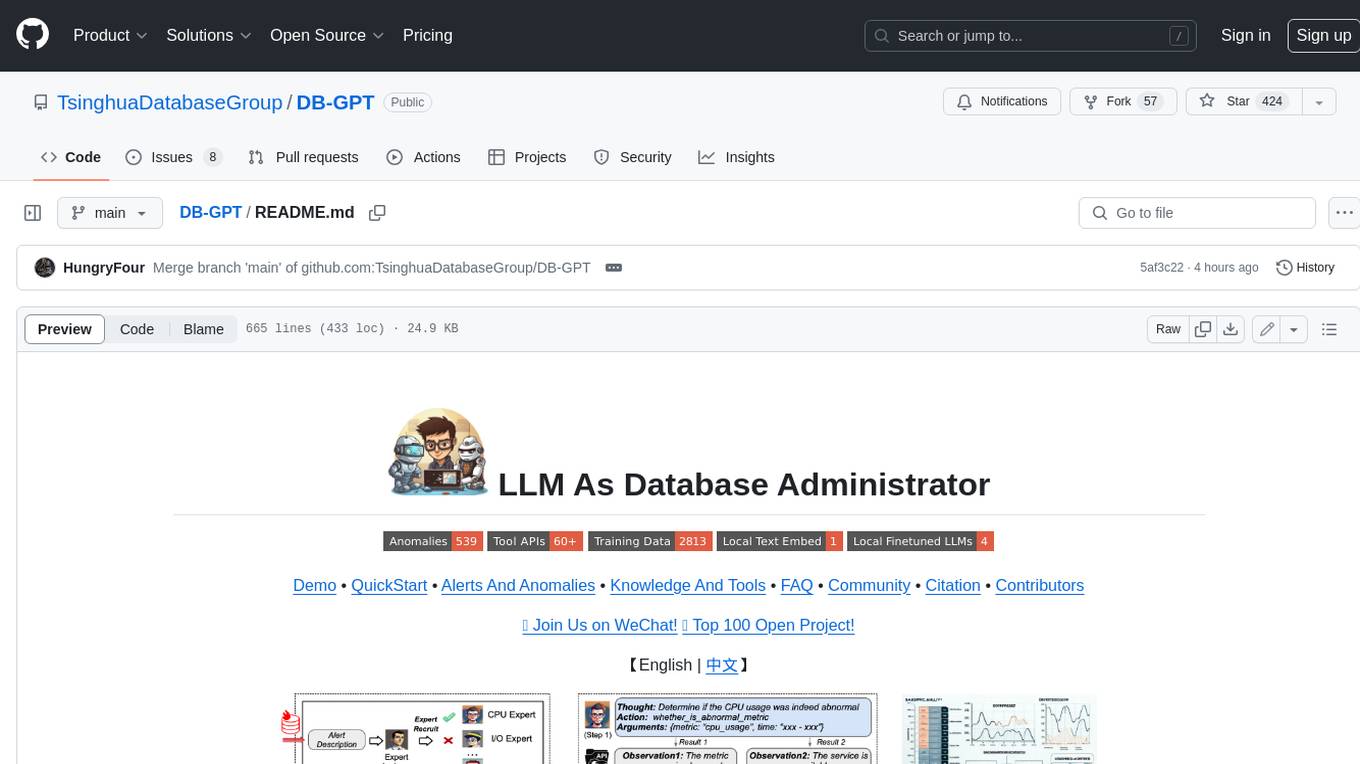
DB-GPT
DB-GPT is a personal database administrator that can solve database problems by reading documents, using various tools, and writing analysis reports. It is currently undergoing an upgrade. **Features:** * **Online Demo:** * Import documents into the knowledge base * Utilize the knowledge base for well-founded Q&A and diagnosis analysis of abnormal alarms * Send feedbacks to refine the intermediate diagnosis results * Edit the diagnosis result * Browse all historical diagnosis results, used metrics, and detailed diagnosis processes * **Language Support:** * English (default) * Chinese (add "language: zh" in config.yaml) * **New Frontend:** * Knowledgebase + Chat Q&A + Diagnosis + Report Replay * **Extreme Speed Version for localized llms:** * 4-bit quantized LLM (reducing inference time by 1/3) * vllm for fast inference (qwen) * Tiny LLM * **Multi-path extraction of document knowledge:** * Vector database (ChromaDB) * RESTful Search Engine (Elasticsearch) * **Expert prompt generation using document knowledge** * **Upgrade the LLM-based diagnosis mechanism:** * Task Dispatching -> Concurrent Diagnosis -> Cross Review -> Report Generation * Synchronous Concurrency Mechanism during LLM inference * **Support monitoring and optimization tools in multiple levels:** * Monitoring metrics (Prometheus) * Flame graph in code level * Diagnosis knowledge retrieval (dbmind) * Logical query transformations (Calcite) * Index optimization algorithms (for PostgreSQL) * Physical operator hints (for PostgreSQL) * Backup and Point-in-time Recovery (Pigsty) * **Continuously updated papers and experimental reports** This project is constantly evolving with new features. Don't forget to star ⭐ and watch 👀 to stay up to date.
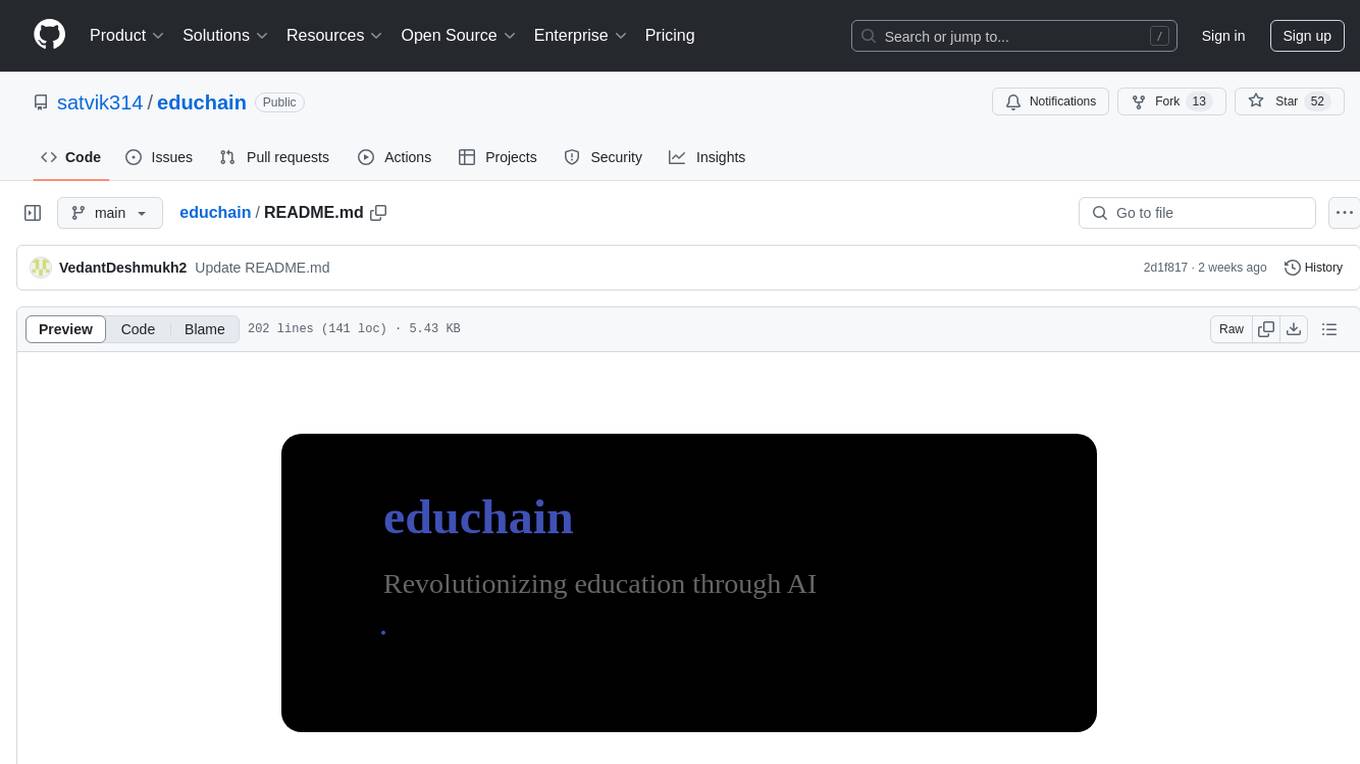
educhain
Educhain is a powerful Python package that leverages Generative AI to create engaging and personalized educational content. It enables users to generate multiple-choice questions, create lesson plans, and support various LLM models. Users can export questions to JSON, PDF, and CSV formats, customize prompt templates, and generate questions from text, PDF, URL files, youtube videos, and images. Educhain outperforms traditional methods in content generation speed and quality. It offers advanced configuration options and has a roadmap for future enhancements, including integration with popular Learning Management Systems and a mobile app for content generation on-the-go.
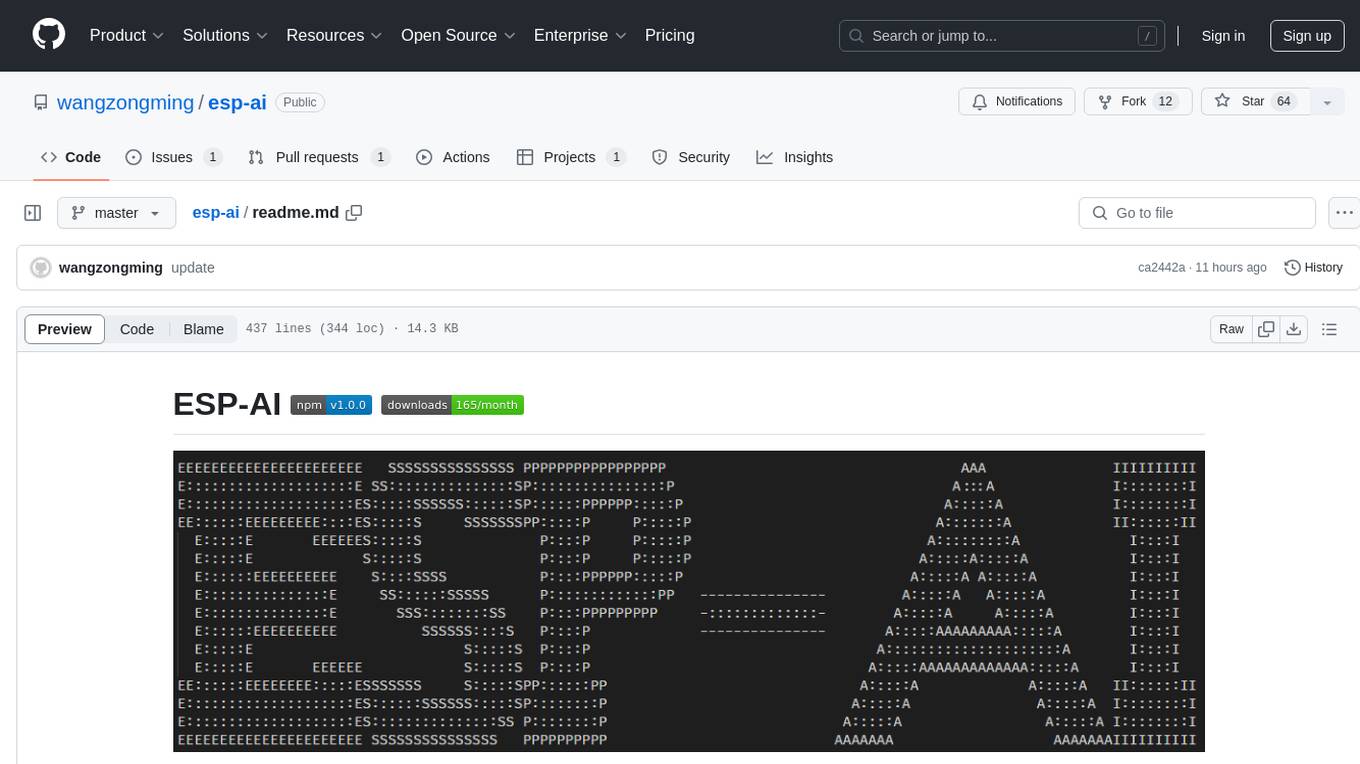
esp-ai
ESP-AI provides a complete AI conversation solution for your development board, including IAT+LLM+TTS integration solutions for ESP32 series development boards. It can be injected into projects without affecting existing ones. By providing keys from platforms like iFlytek, Jiling, and local services, you can run the services without worrying about interactions between services or between development boards and services. The project's server-side code is based on Node.js, and the hardware code is based on Arduino IDE.
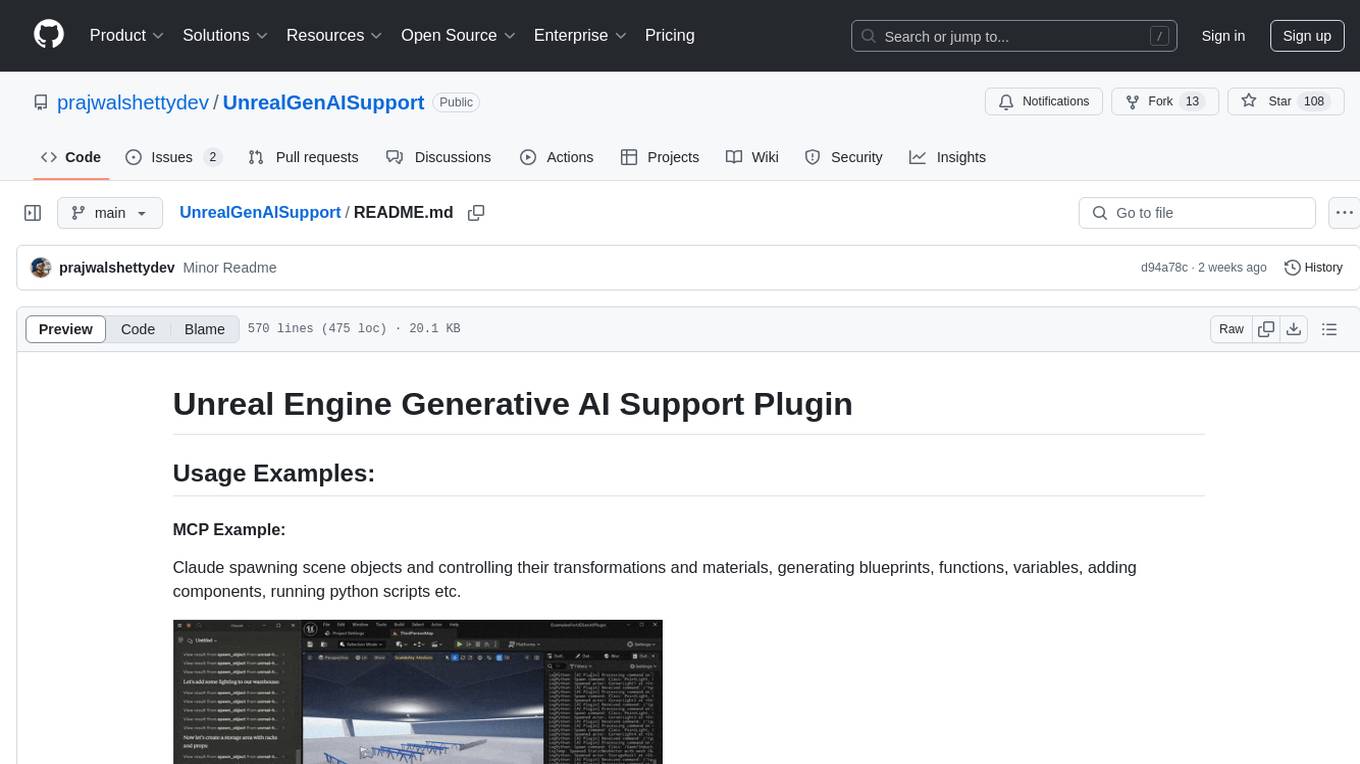
UnrealGenAISupport
The Unreal Engine Generative AI Support Plugin is a tool designed to integrate various cutting-edge LLM/GenAI models into Unreal Engine for game development. It aims to simplify the process of using AI models for game development tasks, such as controlling scene objects, generating blueprints, running Python scripts, and more. The plugin currently supports models from organizations like OpenAI, Anthropic, XAI, Google Gemini, Meta AI, Deepseek, and Baidu. It provides features like API support, model control, generative AI capabilities, UI generation, project file management, and more. The plugin is still under development but offers a promising solution for integrating AI models into game development workflows.
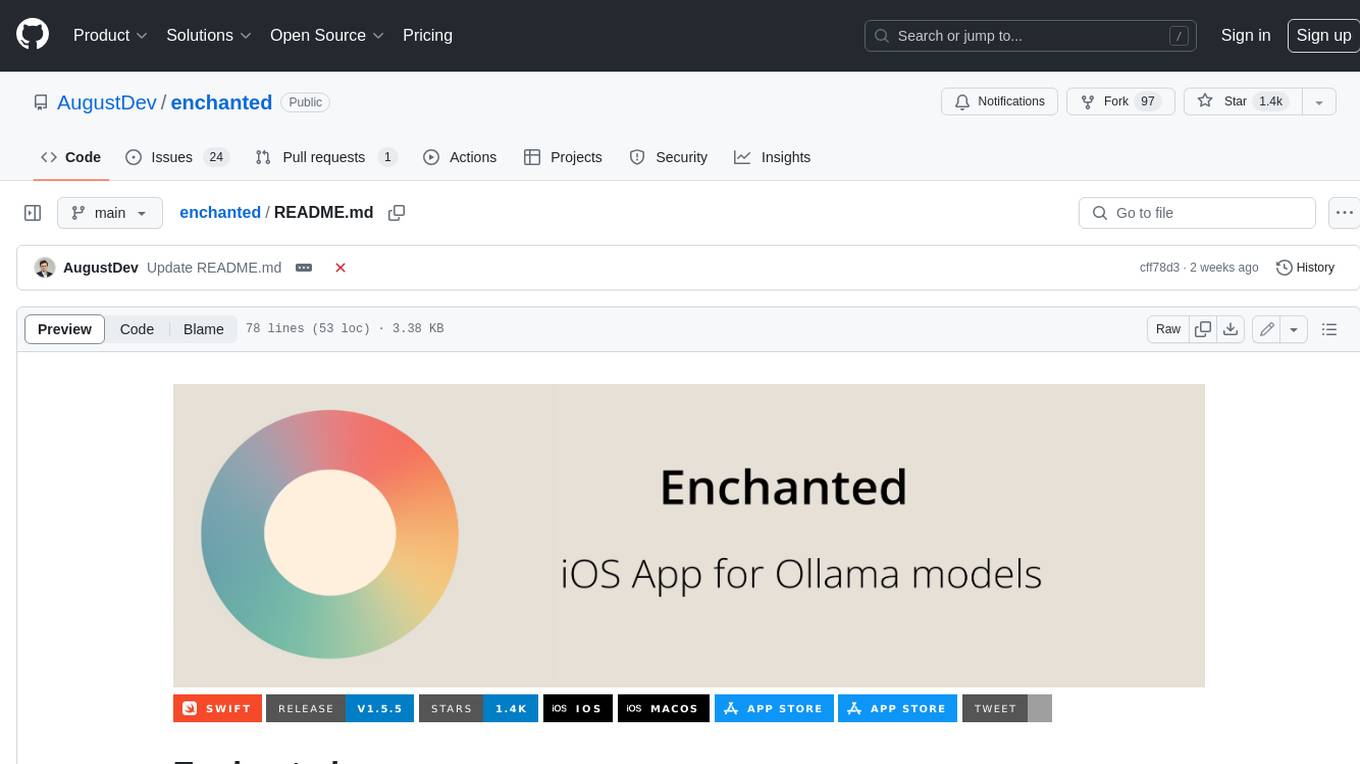
enchanted
Enchanted is an open-source, Ollama-compatible app for macOS and iOS that allows users to work with privately hosted models such as Llama 2, Mistral, Vicuna, Starling, and more. It provides a user-friendly interface for interacting with these models, making it easy to generate text, translate languages, write different kinds of creative content, and more. The app is designed to be secure and private, ensuring that user data is protected. It also offers a range of features such as dark/light mode, conversation history, markdown support, voice prompts, and image attachments.
For similar tasks

ChatTTS
ChatTTS is a generative speech model optimized for dialogue scenarios, providing natural and expressive speech synthesis with fine-grained control over prosodic features. It supports multiple speakers and surpasses most open-source TTS models in terms of prosody. The model is trained with 100,000+ hours of Chinese and English audio data, and the open-source version on HuggingFace is a 40,000-hour pre-trained model without SFT. The roadmap includes open-sourcing additional features like VQ encoder, multi-emotion control, and streaming audio generation. The tool is intended for academic and research use only, with precautions taken to limit potential misuse.
For similar jobs

Perplexica
Perplexica is an open-source AI-powered search engine that utilizes advanced machine learning algorithms to provide clear answers with sources cited. It offers various modes like Copilot Mode, Normal Mode, and Focus Modes for specific types of questions. Perplexica ensures up-to-date information by using SearxNG metasearch engine. It also features image and video search capabilities and upcoming features include finalizing Copilot Mode and adding Discover and History Saving features.

KULLM
KULLM (구름) is a Korean Large Language Model developed by Korea University NLP & AI Lab and HIAI Research Institute. It is based on the upstage/SOLAR-10.7B-v1.0 model and has been fine-tuned for instruction. The model has been trained on 8×A100 GPUs and is capable of generating responses in Korean language. KULLM exhibits hallucination and repetition phenomena due to its decoding strategy. Users should be cautious as the model may produce inaccurate or harmful results. Performance may vary in benchmarks without a fixed system prompt.
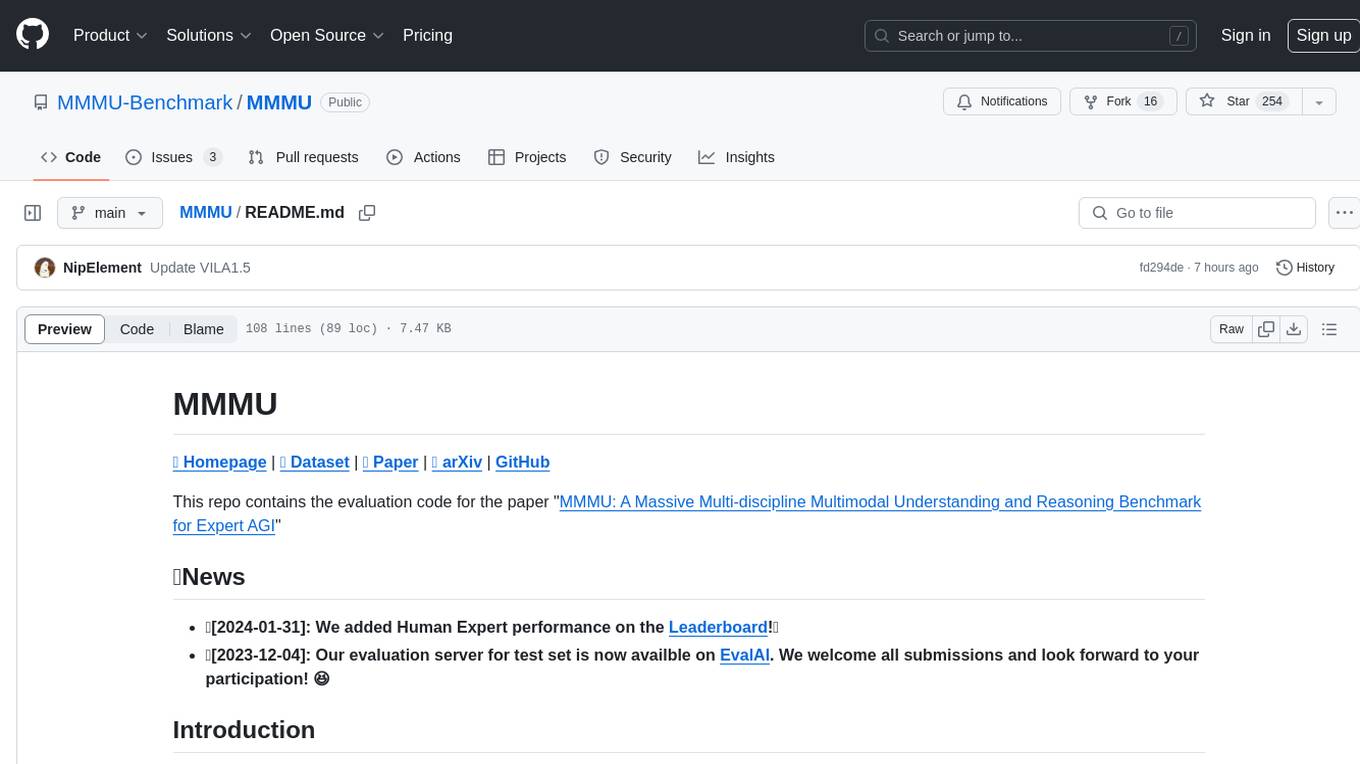
MMMU
MMMU is a benchmark designed to evaluate multimodal models on college-level subject knowledge tasks, covering 30 subjects and 183 subfields with 11.5K questions. It focuses on advanced perception and reasoning with domain-specific knowledge, challenging models to perform tasks akin to those faced by experts. The evaluation of various models highlights substantial challenges, with room for improvement to stimulate the community towards expert artificial general intelligence (AGI).

1filellm
1filellm is a command-line data aggregation tool designed for LLM ingestion. It aggregates and preprocesses data from various sources into a single text file, facilitating the creation of information-dense prompts for large language models. The tool supports automatic source type detection, handling of multiple file formats, web crawling functionality, integration with Sci-Hub for research paper downloads, text preprocessing, and token count reporting. Users can input local files, directories, GitHub repositories, pull requests, issues, ArXiv papers, YouTube transcripts, web pages, Sci-Hub papers via DOI or PMID. The tool provides uncompressed and compressed text outputs, with the uncompressed text automatically copied to the clipboard for easy pasting into LLMs.
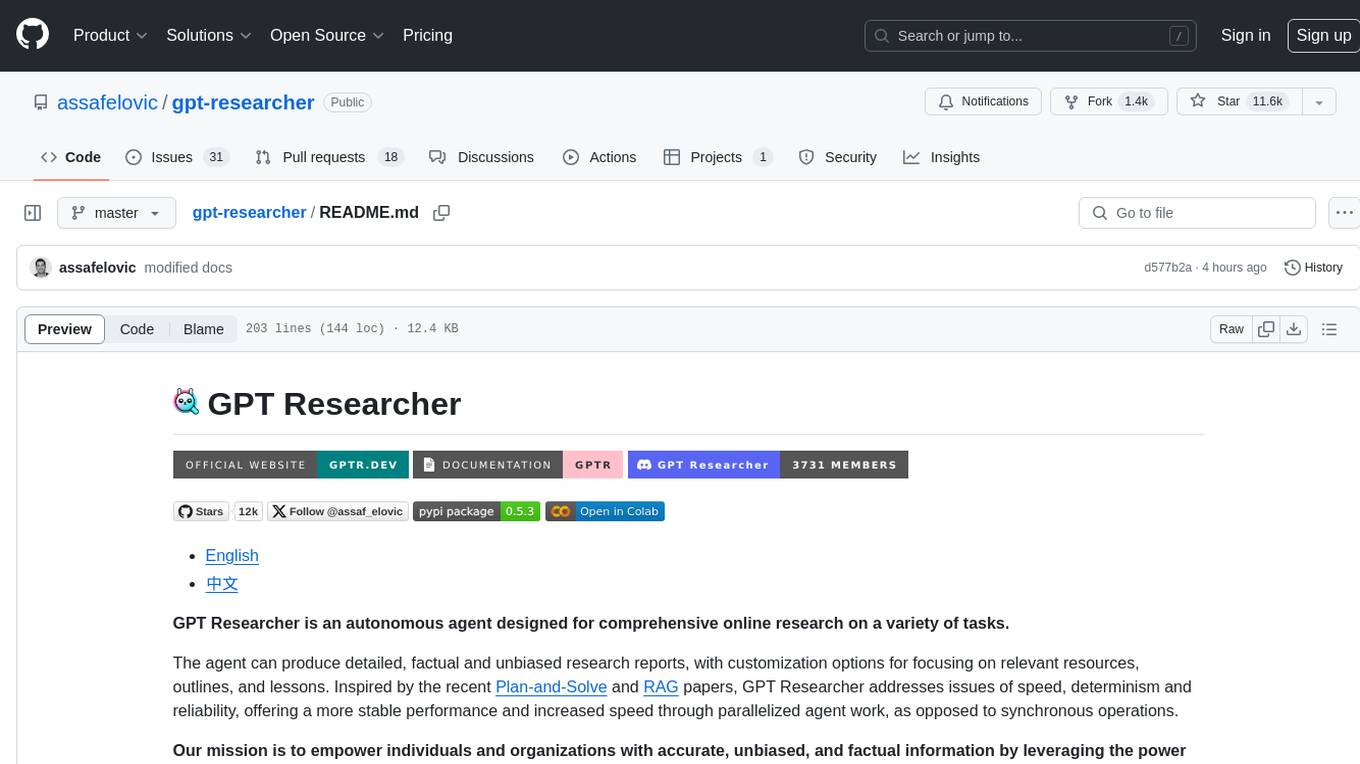
gpt-researcher
GPT Researcher is an autonomous agent designed for comprehensive online research on a variety of tasks. It can produce detailed, factual, and unbiased research reports with customization options. The tool addresses issues of speed, determinism, and reliability by leveraging parallelized agent work. The main idea involves running 'planner' and 'execution' agents to generate research questions, seek related information, and create research reports. GPT Researcher optimizes costs and completes tasks in around 3 minutes. Features include generating long research reports, aggregating web sources, an easy-to-use web interface, scraping web sources, and exporting reports to various formats.

ChatTTS
ChatTTS is a generative speech model optimized for dialogue scenarios, providing natural and expressive speech synthesis with fine-grained control over prosodic features. It supports multiple speakers and surpasses most open-source TTS models in terms of prosody. The model is trained with 100,000+ hours of Chinese and English audio data, and the open-source version on HuggingFace is a 40,000-hour pre-trained model without SFT. The roadmap includes open-sourcing additional features like VQ encoder, multi-emotion control, and streaming audio generation. The tool is intended for academic and research use only, with precautions taken to limit potential misuse.
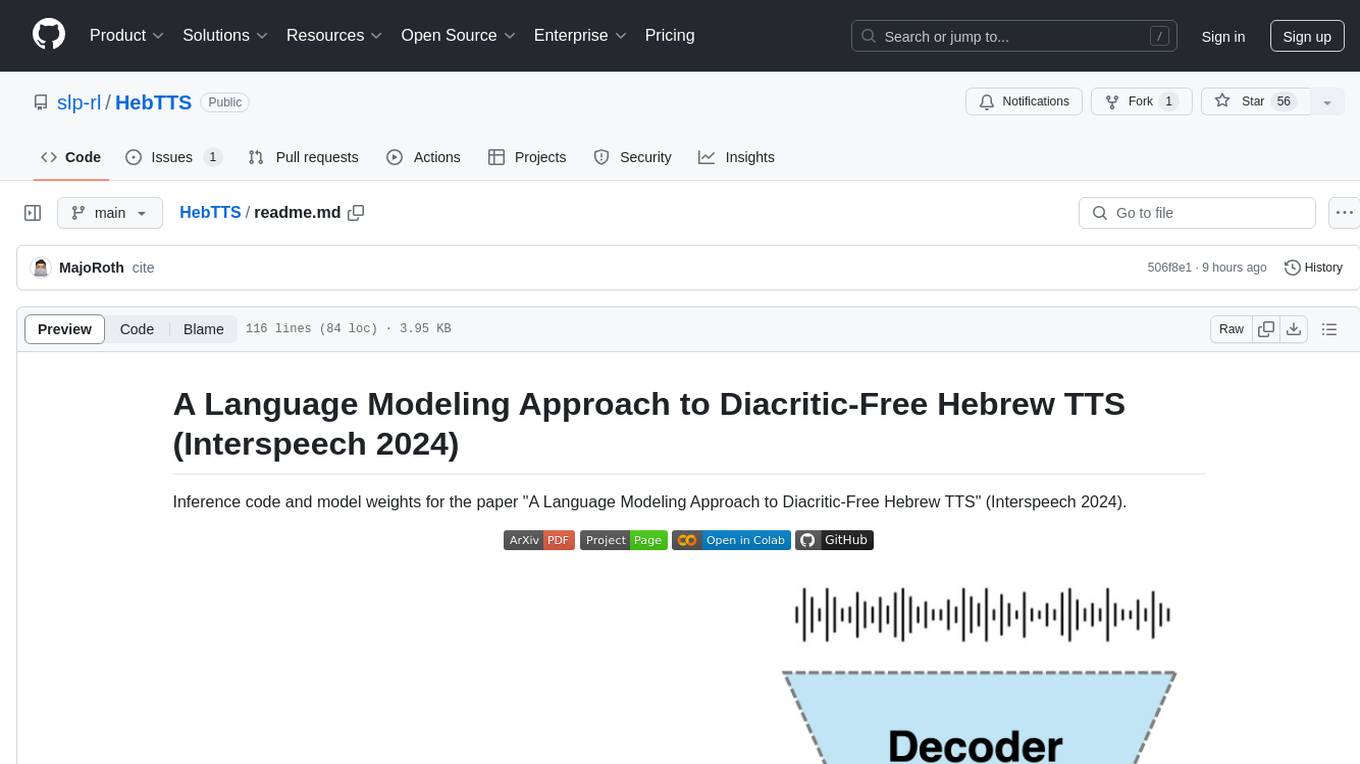
HebTTS
HebTTS is a language modeling approach to diacritic-free Hebrew text-to-speech (TTS) system. It addresses the challenge of accurately mapping text to speech in Hebrew by proposing a language model that operates on discrete speech representations and is conditioned on a word-piece tokenizer. The system is optimized using weakly supervised recordings and outperforms diacritic-based Hebrew TTS systems in terms of content preservation and naturalness of generated speech.
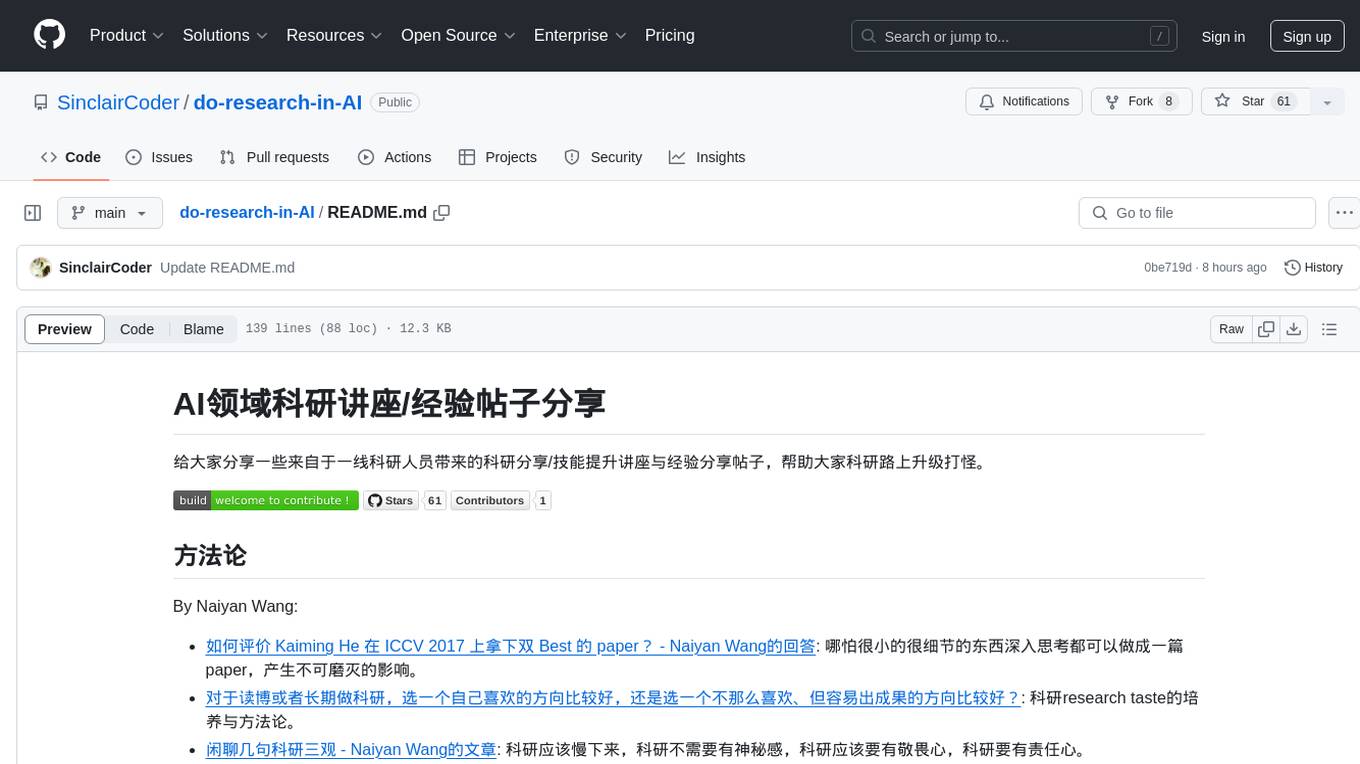
do-research-in-AI
This repository is a collection of research lectures and experience sharing posts from frontline researchers in the field of AI. It aims to help individuals upgrade their research skills and knowledge through insightful talks and experiences shared by experts. The content covers various topics such as evaluating research papers, choosing research directions, research methodologies, and tips for writing high-quality scientific papers. The repository also includes discussions on academic career paths, research ethics, and the emotional aspects of research work. Overall, it serves as a valuable resource for individuals interested in advancing their research capabilities in the field of AI.




